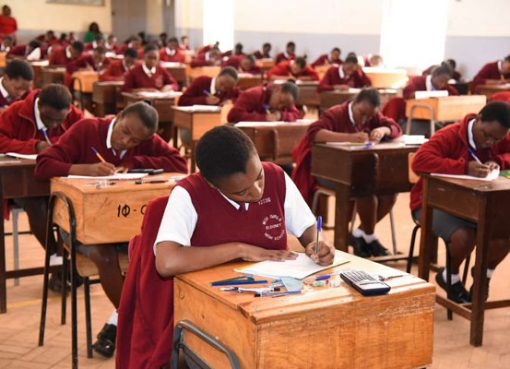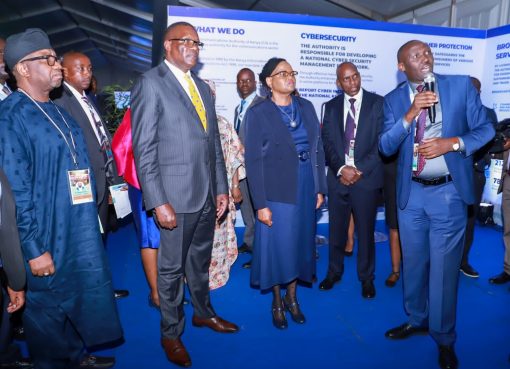Kenya is among countries to benefit from Diageo, makers of Johnnie Walker & Smirnoff, who have pledged to enable the creation of more than 5 million bottles of hand sanitizer.
Through their distiller East Africa Breweries Ltd in Kenya, Diageo will provide 100,000 litres of ethanol to supply to a local sanitizer manufacturer.
Diageo has also donated over a million litres of alcohol to manufacturing partners, to help protect front-line healthcare workers in the fight against COVID-19.
In a press release on Monday, the world’s leading distiller will provide Grain Neutral Spirit (GNS), a 96 percent strength ethyl alcohol, used primarily in production of vodka and gin and make it available at no cost to hand sanitizer producers to help overcome shortages in healthcare systems.
This donation will in turn enable the production of more than 5 million-250ml bottles of hand sanitizer.
The Diageo CEO, Ivan Menezes said the spirit will be made available in supply chains according to local circumstances, working with the relevant authorities and hand sanitizer manufacturers.
He said this will ensure the donation is used for maximum impact in protecting health workers and patients and that sanitizer reaches the front-line as quickly as possible.
“Health care workers are at the forefront of fighting this pandemic and we are determined to do what we can to help protect them. This is the quickest and most effective way for us to meet the surging demand for sanitizer around the world,” said Menezes.
According to Diageo, they will continue to engage with national and local governments across the many countries where the company has major distilling operations.
Apart from Kenya, other beneficiaries include The UK and the Republic of Ireland who are receiving 500,000 litres of GNS that will be made available for national healthcare systems and workers.
North America will also receive 250,000 litres of GNS to be supplied to meet local community needs, while in Brazil, Diageo’s Ypioca plant will produce 200,000 litres of spirit for the local health care system in conjunction with the Ceara state government and in Australia, Diageo’s Bundaberg rum distillery will produce 100,000 litres of ethanol to the Queensland government to be forwarded to hand sanitizer manufacturers.
Alarm over coronavirus has caused a run on hand sanitizers globally and here in Kenya supermarkets have had shortage of the product, which before the outbreak of Corona-virus used to move quite slowly at the shelves.
In efforts to address the shortage, the government last week allowed the use of seized ethanol from the port and customs for manufacture of sanitizers.
The Head of Public Service, Joseph Kinyua had asked the members of the Multi Agency team to identify all ethanol held and release it to Kenya pipeline Company, which will work with oil industry players and expedite manufacture and distribution.
In order to prevent the spread of coronavirus disease, the World Health Organization has recommended that hand hygiene is very important and called on countries to ensure people either wash their hands often with soap and water for at least 20 seconds or use an alcohol-based hand sanitizer that contains 60 to 95 percent alcohol, covering all surfaces of their hands and rubbing them together until they feel dry.
Meanwhile, the service oriented economies like Kenya, Egypt, Ethiopia and Rwanda where air transport, financial and tourism services are relatively strong are now very vulnerable given the nature of the coronavirus epidemic.
The cancellation of air flights, travel bans and restriction of movements of persons will definitely slow down growth leading to job cuts.
In a press release on Monday on the COVID 19 outlining its impact and secondary effects on Countries, COMESA Secretary General Chileshe Mpundu said economic slowdown in Europe, China and the United States will have repercussions given the interconnectedness and fragmentations in production, trade and investment.
He explained that the manufacturing and industrial sectors in COMESA and Africa will be impacted by a decreased supply of key components a result of likely delays in the global supply chain, while in the tourism sector countries will experience reduced incomes generated from meetings, Incentive travel, Conventions and Exhibitions (MICE).
“All indications show that the spread of COVID 19 is on an upward trajectory, thus the African region must be prepared to grapple with the devastating secondary health, social and economic ramifications of the disease,” he said.
Currently, the secretary general noted that most of the regions and countries affected by the coronavirus are the major trading partners for COMESA.
“For the big economies, the effects would be much larger owing to their stronger interconnectedness with the rest of the world compared to smaller economies,” Mpundu said.
He added that diversified economies will also most likely experience less severe effects compared to low diversified one in the work of reduced demand for exports and cut down supply for import sources.
The Secretary General has however, noted that there are cases where the impacts of the pandemic could be positive and countries can take advantage following the economic integration initiatives in Africa.
“The reduction of international crude oil prices provides an opportunity for improvement of the balance of payment position of non-oil producing countries and could drive down production costs and enhance competitiveness and general welfare,” he said.
The reductions in input supplies could further provide yet another opportunity for manufacturing companies in Africa to expand production and supply the continental market under the frameworks of existing Regional Economic Communities (RECs) and the wider African Continental Free Trade Area ((ACFTA).
Mpundu called upon African governments to also provide and sustain a conducive environment to the private sector to expand production capacities and enhance competitiveness and reduce over-reliance on extra African imports even for basic commodities.
“Our countries are encouraged to learn and apply best practices that have worked elsewhere in slowing the spread of the COVID 19 that include restrictions on travel and congregational gatherings, working from home, encouraging cashless transactions, disinfecting public places, enhanced screening and intense public awareness among other measures,” Mpundu said.
He reiterated that the COVID-19 pandemic should be a clarion call for COMESA countries to consolidate and strengthen regional economic integration in Africa towards meeting the aspirations of structural transformation, sustainable and inclusive growth.
“African countries can seize the opportunity and expand intra-African trade currently standing at barely 15 percent of their total trade. The spiral effect of the pandemic provide challenges and opportunities alike,” Mpundu said
Meanwhile, given the relatively weak and over stretched public healthcare systems in Africa, he noted that the current low spread of COVID 19 is likely to change in the coming weeks and may be catastrophic.
Latest statistics indicate that the EU, South Africa and China are the leading export destinations for COMESA exports and accounted for 32 percent (USD 36.1 billion), 13 percent (USD14 billion) and 6 percent (USD7.3 billion share of total export respectively during 2018.
At the same time, the EU, China and US are the biggest sources of imports into COMESA countries accounting for 32 percent (USD 48 billion), 20 percent (USD29.4 billion) and 8 percent (12 billion) share of total imports respectively in 2018.
COMESA brings together 560 million people into a cooperative framework for sustainable economic growth and prosperity through regional integration and as the spread of the Novel Corona Virus (COVID 19) accelerates across the world, the level of infection in the African continent however has been relatively low, compared with other continents partly due to comparatively low integration of Africa with the rest of world.
By Wangari Ndirangu





